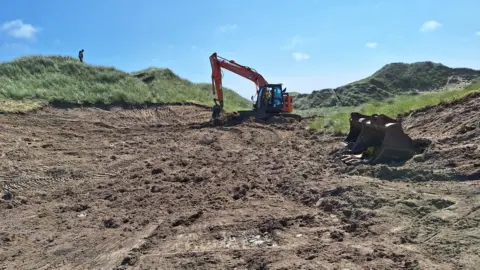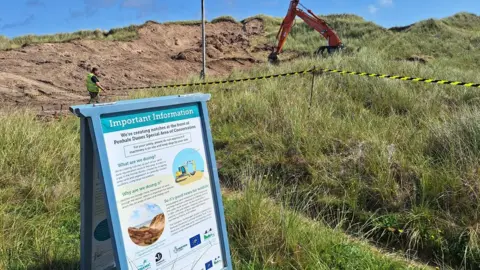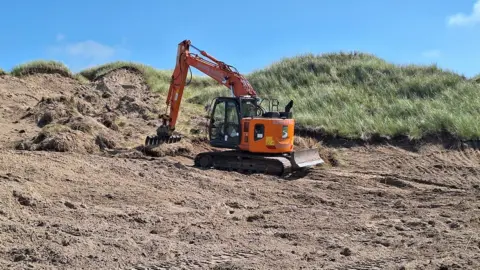Diggers start work to transform Cornish dunes for wildlife
 Cornwall Wildlife Trust
Cornwall Wildlife TrustDiggers are rejuvenating sand dunes in north Cornwall to help rare wildlife thrive on their slopes.
Penhale Dunes, the most extensive system of sand dunes in the county, are home to species including the silver-studded blue butterfly, skylarks and protected plants such as petalwort.
It is hoped excavation works will restore their bare sand habitat.
Jon Cripps, a ranger with Cornwall Wildlife Trust said: "The work will look quite dramatic.
"It's unusual to see big diggers on the dunes, shifting loads of sand.
"However, this short-term disruption should create long-term benefits for lots of dune-adapted wildlife.
"We'll create open spaces for plants like sea holly and sea rocket to colonise and lots of warm sandy niches for the various insects that burrow into sand, such as the tiny silvery leaf-cutter bee, the minotaur dung beetle and the predatory bee-wolf wasp."
 Cornwall Wildlife Trust
Cornwall Wildlife TrustHe added: "We hope the scale of the work will allow the wind to whistle through the dunes and keep these areas mobile, dynamic and diverse for many years to come."
It is estimated that about 50% of Penhale Dunes, a 620-hectare (1,532-acre) site near Perranporth, was comprised of bare sand habitat in the 1940s.
But that has been reduced to less than 2%, the trust said.
It said factors including a lack of large grazing animals eating dune plants and pollution causing greater soil fertility had contributed to dense vegetation and the spread of invasive plants.
Works involve funnelling wind-blown sand from the beach into the dune system behind.
V-shaped notches will be created by diggers, and the area around these will also be stripped of turf, to encourage more dune "mobility", the trust said.
 Cornwall Wildlife Trust
Cornwall Wildlife Trust Sand dunes are listed as the habitat most at risk in Europe for biodiversity loss.
Penhale Dunes are designated nationally as a Site of Special Scientific Interest (SSSI) and internationally as a Special Area of Conservation (SAC).
"Notches" have been successfully created in other parts of the UK as part of the Dynamic Dunescapes project, including at Formby and Ainsdale, on the Sefton Coast.
This will be the first time the technique has been used in Cornwall, the trust said.

Follow BBC News South West on Twitter, Facebook and Instagram. Send your story ideas to [email protected].
